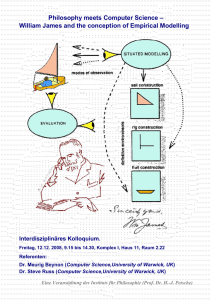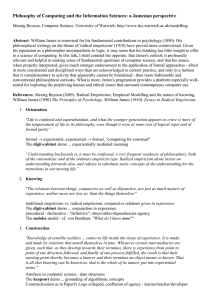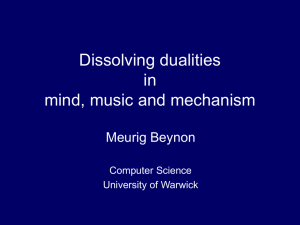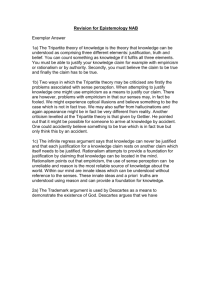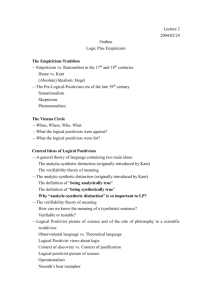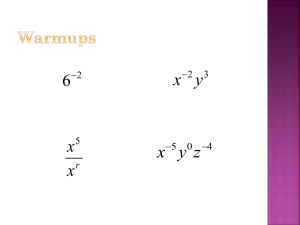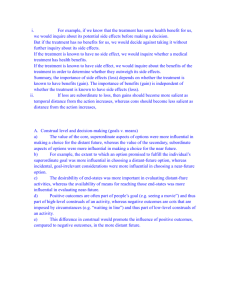Thinking through Computing with Empirical
advertisement
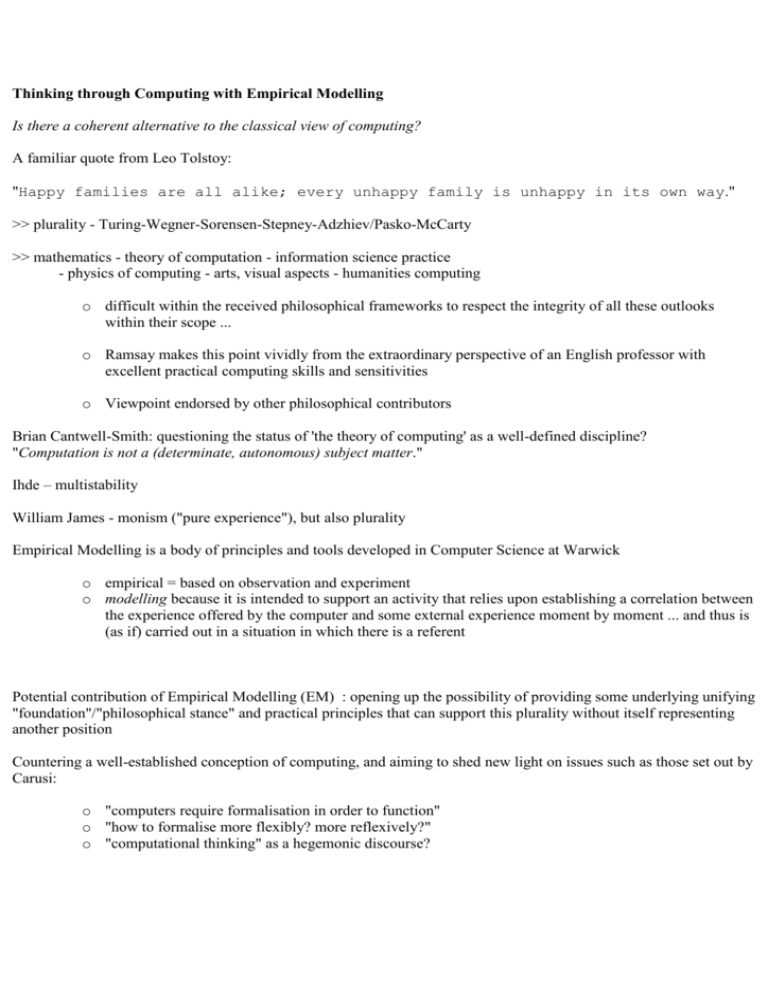
Thinking through Computing with Empirical Modelling Is there a coherent alternative to the classical view of computing? A familiar quote from Leo Tolstoy: "Happy families are all alike; every unhappy family is unhappy in its own way." >> plurality - Turing-Wegner-Sorensen-Stepney-Adzhiev/Pasko-McCarty >> mathematics - theory of computation - information science practice - physics of computing - arts, visual aspects - humanities computing o difficult within the received philosophical frameworks to respect the integrity of all these outlooks within their scope ... o Ramsay makes this point vividly from the extraordinary perspective of an English professor with excellent practical computing skills and sensitivities o Viewpoint endorsed by other philosophical contributors Brian Cantwell-Smith: questioning the status of 'the theory of computing' as a well-defined discipline? "Computation is not a (determinate, autonomous) subject matter." Ihde – multistability William James - monism ("pure experience"), but also plurality Empirical Modelling is a body of principles and tools developed in Computer Science at Warwick o empirical = based on observation and experiment o modelling because it is intended to support an activity that relies upon establishing a correlation between the experience offered by the computer and some external experience moment by moment ... and thus is (as if) carried out in a situation in which there is a referent Potential contribution of Empirical Modelling (EM) : opening up the possibility of providing some underlying unifying "foundation"/"philosophical stance" and practical principles that can support this plurality without itself representing another position Countering a well-established conception of computing, and aiming to shed new light on issues such as those set out by Carusi: o "computers require formalisation in order to function" o "how to formalise more flexibly? more reflexively?" o "computational thinking" as a hegemonic discourse? McBride: "Computer science is an out-of-touch, dying discipline. ... the public perception of computing is that it is neither unusual nor inherently interesting." Empirical Modelling as counter to this - eccentric and in some respects quite unconvincing tools, but principles that seem to engage many people readily - eclectic body of student contributors who have been able to express and enjoy themselves - a vehicle for personal expression Problematic if any proposed "foundation"/"philosophical stance" was to be seen as antagonistic ... Dissolving dualities Dualities concern the presumption of essential irreconcilable difference ... Examples of topical dualities The procedural-declarative "with and without agency" duality In a practical sense, this has been represented in procedural vs declarative programming paradigms ... no satisfactory way to blend these More fundamental concern: the role of agency in our frameworks of thought and conceptions of the world cf. Bertrand Russell and The ABC of Relativity. Eradicating "the agent as a recourse where explanation fails" cf. Elizabethan Chain of Being. Taking a position on computing can relate to this grander concern about agency. Where is the authority that underlies computing: in the physical world, or the rational mind, or the social context? Part of the critique of computing as currently conceived: computer scientists are in danger of presuming too much absolute knowledge of agency (cf putting faith in the machine / faith in the reactive system / faith in the contrived rules) Empirical Modelling (EM) reflects / endorses / adopts a Jamesian stance: real agency can't be known can only be pragmatically determined I conclude then, that real effectual causation as an ultimate nature, as a 'category', if you like, of reality, is just what we feel it to be, just that kind of conjunction which our own activity-series reveal. We have the whole butt and being of it in our hands; and the healthy thing for philosophy if to leave off grubbing underground for what effects effectuation, or what makes action act, and to try to solve the concrete questions of where effectuation in this world is located, of which things are the true causal agents there, and of what the more remote effects consist. William James, The Experience of Activity, Essays in Radical Empiricism, p185-6. ... no philosophic knowledge of the general nature and constitution of tendencies, or of the relation of larger to smaller ones, can help us to predict which of all the various competing tendencies that interest us in this universe are likeliest to prevail. James, ibid: p180 EM not about deciding the absolute truth of anything ... ... but does purport to engage with principles for assessing / evaluating "pragmatic truth" In keeping with this view of agency as something to be pragmatically shaped and personally identified, EM is centrally concerned with the development of construals This does not mean merely a mental construct - a conception of how something is deemed to work (as in "this is how I construe it") In adopting the term construal, we take our inspiration from Gooding: "Construing may be thought of as a process of modelling phenomena while the conceptual necessities of theory are held at arms length." "Construals are a means of interpreting unfamiliar experience and communicating one's trial interpretations. Construals are practical, situational and often concrete. They belong to the pre-verbal context of ostensive practices." "... a construal cannot be grasped independently of the exploratory behaviour that produces it or the ostensive practices whereby an observer tries to convey it.". Gooding: Experiment and the Making of Meaning, 1990 p.22 and p.88 The objective-subjective duality "objective/physical reality" to be interpreted as a classification of experience - likewise the artificial vs the natural ... subjectivity and objectivity are affairs not of what an experience is aboriginally made of, but of its classification. William James, The Place of Affectional Facts, Essays in Radical Empiricism, p141. Promoting the personal and subjective is in keeping with emphasising: the visual perspective (Adzhiev/Pasko) the empiricist perspective (Wegner) a phenomenological perspective (Ihde) physical embodiment (Stepney) human negotiation of meaning (McCarty) the culturally constructed user (Ilyes) the computer as instrument (Clark) an empiricist view of mathematics (Petsche) In EM, put the primary emphasis on the capacity that we gain from computing technology to make artefacts that serve an imitative role, in keeping with - James's view that "the relations between things, conjunctive as well as disjunctive, are just as much matters of experience, neither more nor less so, than the things themselves" - James's concern to root all knowledge in the personal experience of conjunctions Other dissolving dualities ... developer-user artefact - construal - model - program generating sensations - realising understanding - precisely imitating - reliably prescribing not intrinsic characteristics of the artefact, but roles expressed in acknowledgment of adopted modes / patterns of interaction and interpretation ... and some casualties: blending procedural with declarative, but no longer programming blending process with substance ... but not process as methodically interpreted. "fumbling about" better conveys nature of the activity (cf. Vincenti's 'blind variation') cf Roszak's reservations re 'experience' and information ... 'In the empiricist tradition "experience" has come to be the equivalent of information. It is the sensory data which we collect in neat, well-packaged, portions to test propositions about the world in a strictly logical way.' ... a very artificial form of experience suited to laboratories and court rooms, rather than the ... 'unstructured, ... turbulent stream [which] passes into memory' state-as-given-in-experience rather than computation-like behaviour - dependencies as establishing semantic bonds - their fluidity, as context and observer dependent "If from the top of a long cold barren hill I hear the distant whistle of a thrush which seems to come up from some warm woody shelter beyond the edge of the hill, this sound coming faint over the rocks with a mingled feeling of strangeness and joy, the idea of the place about me, and the imaginary one beyond will all be combined together in such a manner in my mind as to become inseparable." From an essay by Hazlitt (1835) Historical context Many precedents and parallel developments ... legacy of analogue - experiential, interaction with physical world, not the linguistic and symbolic hybrid computing - combining the digital and the analogue phenomenology / empiricism - but why Radical Empiricism? interactive computing widespread use of dependency in spreadsheets and in other software What is distinctive? what the computer has done to liberate the construction of artefacts what Empirical Modelling can potentially do to liberate the construction of artefacts: observation, dependency and agency conceptual foundation attention paid to grounding / evolving semantic relation nature of the support for: o negotiation of meaning o constructionism (cf. Logo - Papert) o integration of human and computer activity o ... rooting in immediate personal experience is vital in these use to which dependency is put - "a methodology for modelling with dependency" a lot of precedent in historical practice (e.g. analogue computing), philosophical traditions (e.g. phenomenology) and in practical computing (e.g. spreadsheets) BUT do need to be discriminating about practices: contribution of EM is to an epistemological framework consider for example how carefully good principles of scientific experiment and for systems engineering have to be framed, and how much these ultimately must rely on observation and interaction in situations that can be reliably revisited .. more historical context ... <p> William James: "Varieties of Religious Experience" Beth sydd i mi yn y byd? Gorthrymderau mawr o hyd. What is there for me in the world? Great tribulations always. Tragwyddoldeb = eternity Poetic meanings primary and the more primitive ... Don Paterson: T.S.Eliot Lecture 2004, The Dark Art of Poetry As an Indian friend said to me the other day - in this country you spend a lot of time trying to connect things that are already connected. So here's how you achieve 'access': you remove all the mediators. ... Our defining heresy as poets is that we know that sound and sense are the same thing. Everyone else thinks them merely related. We need not connect what is already joined; to unite things again, we so often have to remove our own clumsy connections, our own redundant mediation. The acoustic and semantic properties of the word are not even interchangeable for us; they are wholly consubstantial. They arose together, and to talk of one is to talk of the other. We allow our ear to think for us. cf. agent-based systems research: attempting to define the term "agent" road map culture By contrast, create an entity in EM for which all it IS is what can be done with it by way of interaction and interpretation experientially/phenomenologically-led - concept emergent [Bode seemingly] performs on all these conjunctive relations (...) the usual rationalistic act of substitution - he takes them not as they are given in their first intention, as parts constitutive of experience's living flow, but only as they appear in retrospect, each fixed as a determinate object of conception, static, therefore, and contained within itself. Against this rationalistic tendency to treat experience as chopped up into discontinuous static objects, radical empiricism protests. ... Kierkegaard is cited as saying that: We live forwards, but we understand backwards ... Understanding backwards is, it must be confessed, a very frequent weakness of philosophers, both of the rationalistic and of the ordinary empiricist type. Radical empiricism alone insists on understanding forwards also, and refuses to substitute static concepts of the understanding for the transitions in our moving life. William James: Is Radical Empiricism Solipsistic?, Essays in Radical Empiricism p236-9 William James as exceptional in stance re the symbolic (?) Keywords ... Raymond Williams's acknowledgment of the word as a living entity Suppose that each word names some discriminable item. Then] by this rule, every conjunction and preposition in human speech is meaningless. The truth is that neither elements of fact nor meanings of words are separable as our words are. William James: Some Problems of Philosophy cf. varieties of algebra - particular systems of axioms leading to coherent classes of algebra with unifying and characterising properties stabilities in experience - first encountered / found in experience cf Idhe's multistabilities can't legislate for what we find by way of connection and stability, though we do have discretion over the situation and the experimental practice Experiences come on an enormous scale, and if we take them all together, they come in a chaos of incommensurable relations that we can not straighten out. We have to abstract different groups of them, and handle these separately if we are to talk of them at all. But how the experiences ever get themselves made, or why their characters and relations are just such as appear, we can not begin to understand. William James: Two minds can know one thing, Essays in Radical Empiricism, p132-3
